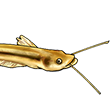Question about bn's and genetics
-
jetajockey
- Posts: 15
- Joined: 29 Sep 2010, 01:36
- Location 2: pensacola fl
Question about bn's and genetics
Hi. I got a group of bn's last year and now they are breeding. I was told that they all come from the same parents, so they are all related. In the group is 2 shortfin calicos, 2 longfin browns, 1 longfin calico, and a longfin albino.
I'm finding babies everywhere and I habe no clue which ones are the parents. They appear to be shortfin brown but I don't know if there's a certain age that I can tell the finnage apart.
Would it be a good idea to segregate the longfin adults from the shortfins? I'd like to maximize the amount of longfin fry I get, but I wasn't sure how the traits are passed on.
Thanks in advance!
I'm finding babies everywhere and I habe no clue which ones are the parents. They appear to be shortfin brown but I don't know if there's a certain age that I can tell the finnage apart.
Would it be a good idea to segregate the longfin adults from the shortfins? I'd like to maximize the amount of longfin fry I get, but I wasn't sure how the traits are passed on.
Thanks in advance!
- Suckermouth
- Posts: 1609
- Joined: 28 Nov 2003, 14:29
- My images: 17
- My cats species list: 22 (i:0, k:0)
- My aquaria list: 2 (i:0)
- My BLogs: 6 (i:0, p:237)
- Spotted: 14
- Location 1: USA
- Location 2: Washington, DC
Re: Question about bn's and genetics
The long-finned trait is dominant, which simplifies matters if you want long-finned fry. Short-finned fish will never give you long-finned fry. Long-finned fish will always give you long-finned fry, although not all of the fry will necessarily be long-finned.
To maximize the number of long-finned fry, you need to be breeding two parents that are pure for long fins. There's no way to guarantee a fish is pure for this trait unless 1) you know its parents or 2) you do some breeding experiments to see what the fry will be.
This trait follows Mendelian inheritance, so if you know about Punnett Squares and pea inheritance then it's analogous.
To maximize the number of long-finned fry, you need to be breeding two parents that are pure for long fins. There's no way to guarantee a fish is pure for this trait unless 1) you know its parents or 2) you do some breeding experiments to see what the fry will be.
This trait follows Mendelian inheritance, so if you know about Punnett Squares and pea inheritance then it's analogous.
- Milton Tan
Research Scientist @ Illinois Natural History Survey
Research Scientist @ Illinois Natural History Survey
-
jetajockey
- Posts: 15
- Joined: 29 Sep 2010, 01:36
- Location 2: pensacola fl
Re: Question about bn's and genetics
awesome, thanks for the reply. That clears things up.
Also, the albino thing, same deal?
Also, the albino thing, same deal?
- Suckermouth
- Posts: 1609
- Joined: 28 Nov 2003, 14:29
- My images: 17
- My cats species list: 22 (i:0, k:0)
- My aquaria list: 2 (i:0)
- My BLogs: 6 (i:0, p:237)
- Spotted: 14
- Location 1: USA
- Location 2: Washington, DC
Re: Question about bn's and genetics
Albinism is recessive. Albino fish will always give albino fish, but if you breed an albino fish with a normal fish, you will not get any albino fry (however, the fry will all carry a "hidden" albino "allele"). As with long-finned fish, the best way to keep getting albino fry is to simply breed two albino fish together; all of the fry will be albino in this situation. However, unlike the long-finned trait, you automatically know that albino fish are pure for the albino trait (they have two albino alleles); this is because long fins are dominant and albinism is recessive.
If a brown fish had albino parents, it can have albino albino young if it is 1) bred with a brown fish that had albino parents or 2) bred with an albino fish. You will get 25% and 50% albino fry, respectively.
If a brown fish had albino parents, it can have albino albino young if it is 1) bred with a brown fish that had albino parents or 2) bred with an albino fish. You will get 25% and 50% albino fry, respectively.
- Milton Tan
Research Scientist @ Illinois Natural History Survey
Research Scientist @ Illinois Natural History Survey




